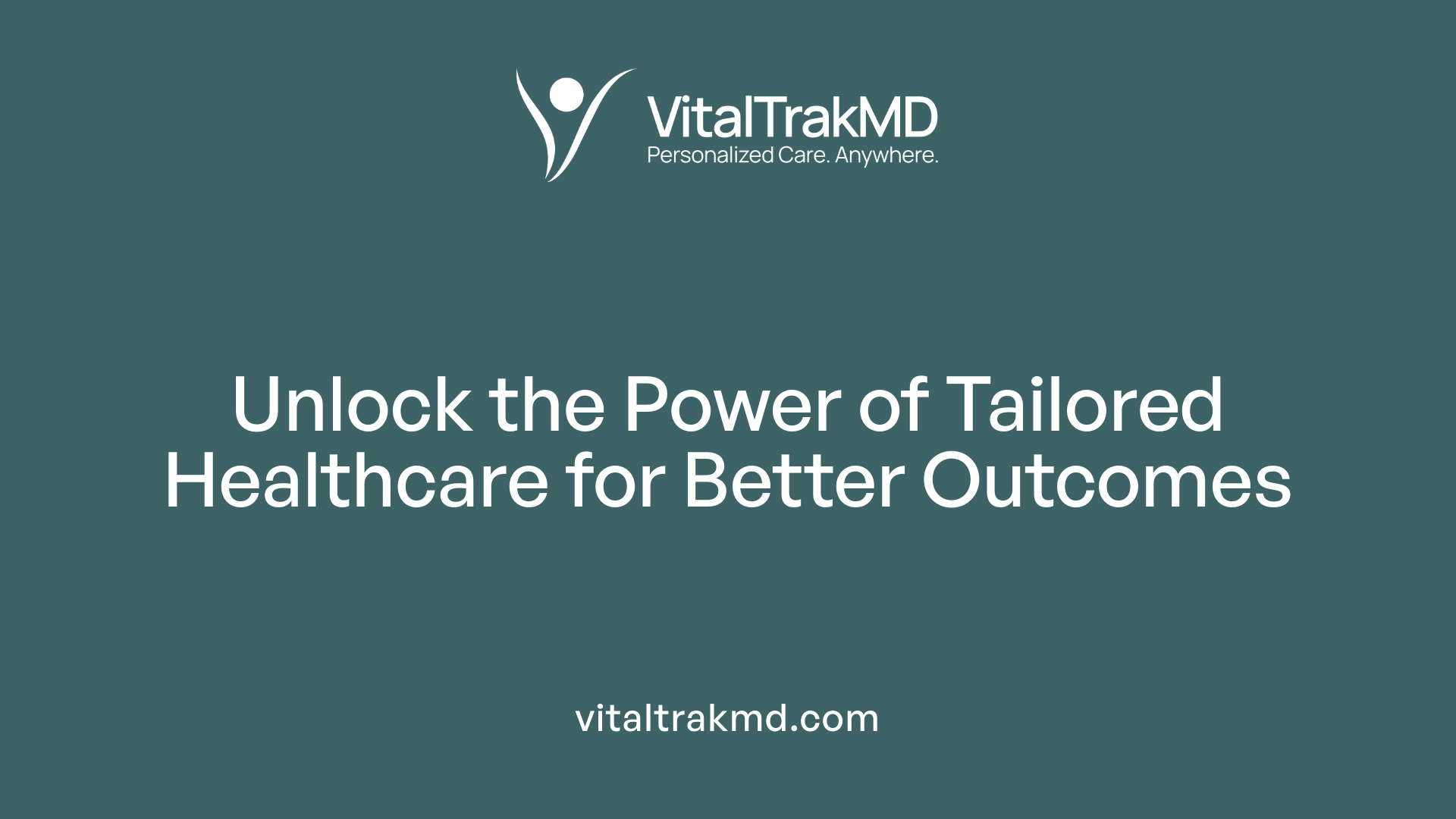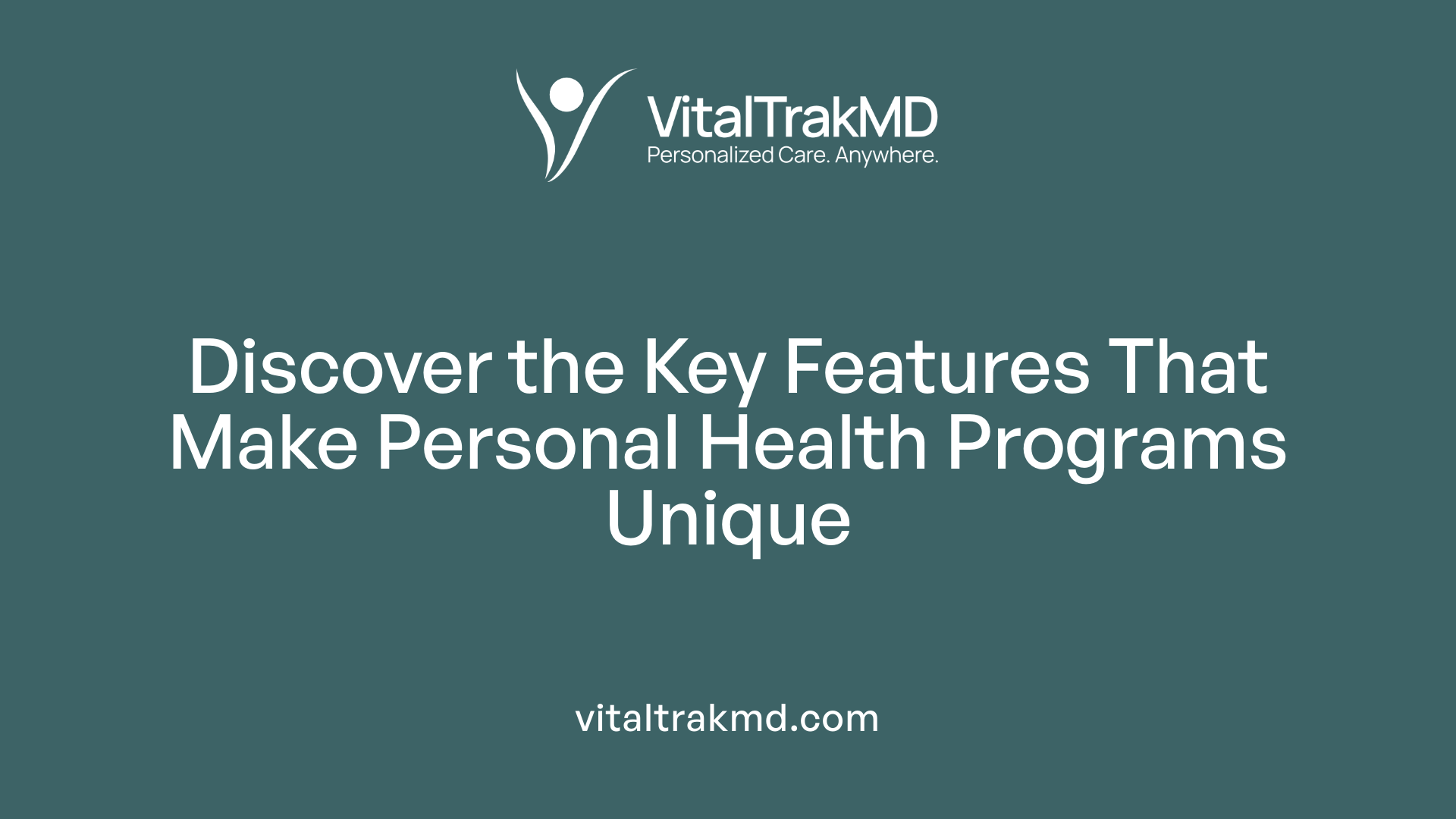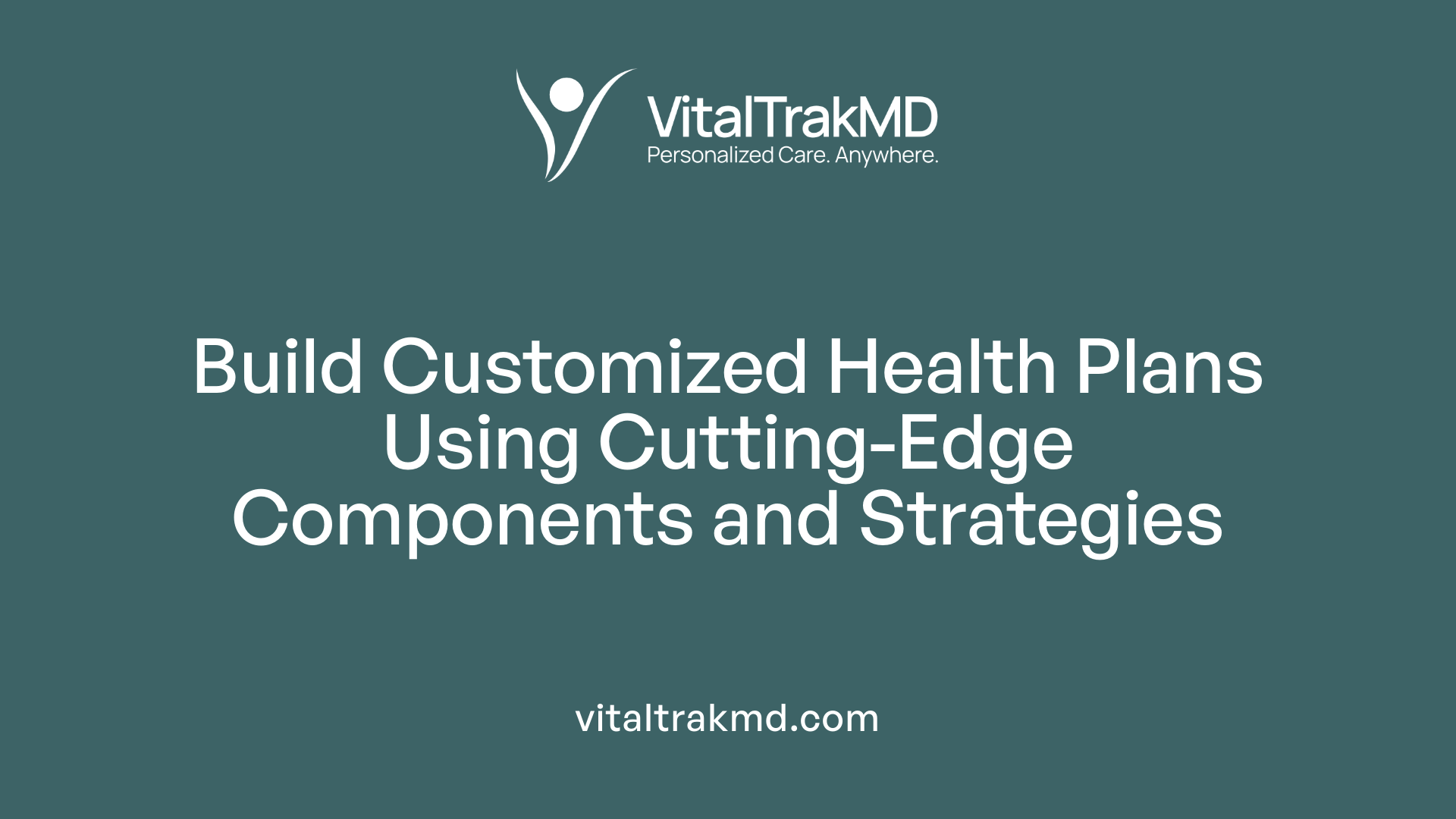What Makes a Health Program Truly "Personalized"?

Understanding What Truly Defines a Personalized Health Program
In an era where technology, genomics, and data analytics converge, personalizing healthcare has transitioned from an ambitious ideal to a practical necessity. This article explores the core concepts, innovative methodologies, and future directions that make health programs genuinely tailored to individual needs, ultimately revolutionizing patient care and health outcomes.
Defining a Truly Personalized Health Program
 A truly personalized health program represents a proactive and comprehensive approach to healthcare that centers on the individual. It integrates a person’s unique genetic makeup, medical history, lifestyle, environmental influences, and social factors to create tailored strategies aimed at enhancing health outcomes.
A truly personalized health program represents a proactive and comprehensive approach to healthcare that centers on the individual. It integrates a person’s unique genetic makeup, medical history, lifestyle, environmental influences, and social factors to create tailored strategies aimed at enhancing health outcomes.
At its core, such a program emphasizes early detection and preventive measures. This includes utilizing advanced predictive technologies, regular health monitoring, and early screening tools to identify health risks before symptoms manifest. This proactive stance allows for timely interventions that can prevent the progression of chronic conditions or the development of new illnesses.
Personalized health programs rely heavily on technology. Critical tools include health risk assessments, which evaluate genetic risks and other health determinants, and digital health technologies such as remote monitoring devices, mobile apps, and AI analytics. These smart tools gather data continuously and adjust care strategies in real-time, ensuring interventions stay aligned with the individual’s evolving health status.
A fundamental principle of these programs is shared decision-making. Patients and healthcare providers collaborate to set personalized goals, which are revisited and refined over time. Care coordination across multiple providers ensures comprehensive management, addressing physical health, mental well-being, and social needs.
Ultimately, the goal of a personalized health program is to improve clinical outcomes and quality of life while reducing healthcare costs. By focusing on prevention, early detection, and customized care, these programs foster a patient-centered system that is more effective, efficient, and responsive to individual needs.
Distinctive Features and Characteristics of Personalized Health Programs

What are the key features and characteristics that distinguish personalized health programs?
Personalized health programs stand out by tailoring healthcare to an individual’s unique biological makeup, lifestyle, and environment. This approach leverages advanced diagnostic tools such as genetic and genomic testing, wearable devices, and sophisticated data analytics.
A core element of these programs is comprehensive health risk assessments, which include genetic profiling, biomarker analysis, and self-assessment tools like the Whole Health Self-Assessment (PHI). These enable clinicians and patients to collaboratively develop health goals and care plans that are specific to the individual.
Technology integration is fundamental, with AI and machine learning algorithms analyzing vast amounts of health data to provide predictive insights, early detection of risks, and personalized treatment strategies. Electronic health records (EHRs) and virtual health assistants also support seamless care coordination.
Personalized health programs focus on preventive care by identifying vulnerabilities before symptoms develop. They encourage active participation through behavioral science techniques, digital nudges, and continuous engagement strategies.
Overall, these programs aim to shift healthcare from a reactive model to a proactive, patient-centered system that promotes wellness, reduces unnecessary interventions, and increases satisfaction by involving patients in every step of their health journey.
From predictive analytics to wearable tech, the emphasis is on creating an integrated, intelligent, and adaptive system that maximizes health outcomes and optimizes healthcare costs.
Developing Personalized Health Plans: Components and Methodologies

What components and methodologies are used to develop personalized health plans?
Creating effective personalized health plans involves a thorough understanding of an individual's health status and needs, achieved through various assessments and data collection methods. The process begins with comprehensive clinical assessments, which include health risk evaluations, biometric data collection via wearable devices, and genetic testing to uncover underlying health factors.
Patient self-assessments, such as the Personal Health Inventory (PHI), are also integral. These tools help individuals and clinicians identify priorities, behavioral patterns, and personal goals. Key methodologies include shared goal setting, where patients and healthcare providers collaboratively define attainable health objectives.
Behavioral strategies play a central role by encouraging sustainable lifestyle changes through tailored coaching, motivational interviewing, and proactive engagement techniques. Visualization tools like The Circle of Health are often utilized to motivate patients, making health priorities clear and manageable.
The development process emphasizes setting SMART (specific, measurable, attainable, relevant, and time-bound) goals to create clear pathways for health improvements. This approach fosters motivation, adherence, and long-term commitment.
Technology enhances personalization through the integration of wearable devices, telemedicine platforms, and predictive analytics. These tools facilitate continuous monitoring, real-time feedback, and plan adjustments based on dynamic health data.
Care coordination is vital, ensuring seamless communication among patients, clinicians, and other health professionals, whether through digital health records or integrated care teams. This promotes consistency and supports ongoing behavioral and clinical management.
Ultimately, personalized health plans blend clinical data, behavioral science, patient input, and innovative technology. This systematic approach helps craft tailored, proactive healthcare strategies that evolve with each individual's changing needs, leading to better health outcomes, increased engagement, and more sustainable lifestyles.
The Role of Data in Personalized Healthcare

How does data collection, analysis, and integration contribute to personalization in healthcare?
Data is the backbone of modern personalized healthcare. Collecting diverse information—from electronic health records (EHRs) and genetic profiles to wearable device outputs and patient-reported outcomes—creates a rich, detailed picture of each individual’s health status.
Analyzing this data through sophisticated methods like machine learning and predictive analytics helps identify unique health patterns, risk factors, and potential complications for patients. This enables clinicians to craft customized diagnosis and treatment plans that are far more precise than traditional one-size-fits-all approaches.
Integrating data from various sources breaks down silos that often hinder comprehensive care. When all relevant information—medical history, genomic data, lifestyle habits, and social determinants—is seamlessly connected, healthcare providers gain a holistic view of the patient. This promotes better decision-making and tailored interventions.
Beyond clinical data, patient-generated inputs and social insights enrich understanding and help customize communication and support strategies. For example, wearable devices continuously monitor vital signs and activity levels, feeding real-time data into care plans.
The ultimate benefit is a shift towards a proactive, rather than reactive, healthcare model. Data-driven approaches improve health outcomes, increase patient engagement, and optimize resource use. As data analysis methods evolve, so does the potential to deliver Highly personalized, effective care that adapts over time to the patient’s changing needs.
Building a Trust-Based Patient-Provider Relationship
Why is the patient-provider relationship crucial in personalized healthcare?
A strong patient-provider relationship forms the foundation of effective personalized care. Trust and open communication enable healthcare providers to understand each patient’s unique needs, preferences, and circumstances accurately. When patients trust their clinicians, they are more likely to share important details about their health, lifestyle, and concerns, which is essential for tailoring treatment plans.
Consistent relationships with the same provider build familiarity and trust, making patients feel more comfortable and respected. This openness encourages adherence to prescribed therapies and active participation in shared decision-making.
Shared decision-making involves clinicians and patients working together to discuss options, weigh benefits and risks, and choose treatments aligned with the patient’s values. This collaborative approach enhances patient satisfaction, increasing motivation and engagement with care.
Moreover, a trusted relationship can improve health literacy, helping patients better understand their conditions and treatments. Better understanding leads to better health outcomes and reduces health disparities.
Ultimately, the patient-provider bond is critical for the success of personalized healthcare, facilitating not only effective treatment but also fostering long-term engagement, improved health outcomes, and higher patient satisfaction. Building and maintaining this trust ensures care is respectful, patient-centered, and tailored to individual health journeys.
Advantages and Patient-Centric Benefits of Personalized Healthcare
What are the benefits and advantages of personalized healthcare for patients?
Personalized healthcare significantly enhances the overall patient experience by focusing on tailored treatment strategies that match an individual’s unique genetic, environmental, and lifestyle factors. This customization leads to more accurate diagnostics and effective therapies, which often translate into improved health outcomes.
One major benefit is increased treatment efficacy. When therapies are specifically designed for a patient’s genetic makeup, such as in precision medicine, they are more likely to succeed and cause fewer side effects. This not only improves the quality of care but also boosts patient confidence and satisfaction.
Adherence to medication and treatment plans greatly benefits from personalization. By engaging patients with plans that align with their preferences and lifestyles, healthcare providers can foster better participation and commitment. Well-informed and involved patients tend to follow through more consistently, resulting in better health management.
Early detection is another critical advantage. Advances in genetic testing and biomarker analysis enable the identification of risks and diseases sooner, often before symptoms appear. Such proactive strategies allow for preventive measures or early interventions, reducing the severity and cost of treatment.
Patient engagement is further strengthened by the use of digital tools, wearable devices, and continuous health monitoring, which provide real-time data and personalized alerts. These innovations motivate patients to stay proactive about their health and foster a collaborative relationship with healthcare providers.
However, personalized healthcare also presents challenges. Higher costs and increased complexity can create barriers to access. Insurance coverage may lag behind emerging technologies, impacting affordability and adherence for some individuals.
Overall, personalized healthcare empowers patients through more precise, effective, and engaging medical care, ultimately leading to healthier lives and improved satisfaction with the healthcare system.
Innovations, Future Directions, and the Impact of Personalized Medicine
What are the future directions and innovations in health customization and personalization?
The future of personalized healthcare is poised for transformative growth driven by rapid advancements in several technological fields. Central to this evolution are genomics, artificial intelligence (AI), and sophisticated data analytics.
Genomic advances, such as next-generation sequencing (NGS) and digital PCR, are refining our ability to analyze individual genetic profiles. These tools help identify mutations, genetic biomarkers, and disease susceptibilities with high precision, enabling clinicians to craft highly tailored treatments, especially in areas like cancer therapy through targeted drugs and companion diagnostics.
AI and data analytics are revolutionizing how health data is interpreted. These technologies can process vast and complex datasets—from electronic health records (EHRs), wearable device outputs, to social determinants of health—to generate actionable insights. AI-driven predictive models offer early detection of diseases, optimize treatment plans, and support clinical trial design, making healthcare more proactive than reactive.
Digital health tools further expand personalization possibilities. Wearables, mobile apps, and telehealth platforms collect real-time health information, facilitate continuous monitoring, and deliver personalized interventions. For example, digital biomarkers derived from passive data can signal health risks before symptoms appear. Personalized chatbots and gamified health applications keep patients engaged and motivated, promoting adherence to treatment and lifestyle recommendations.
Mass customization concepts, inspired by industries like manufacturing, are being adapted to healthcare. These frameworks aim to provide integrated, patient-centric solutions—blending medical, behavioral, social, and environmental data—into coherent care pathways. Such approaches help align clinical goals with individual preferences, cultural backgrounds, and unique health journeys.
Early detection efforts are amplified through integrated data ecosystems, allowing for the proactive management of chronic diseases and the identification of potential health issues before escalation. Technologies such as liquid biopsies and multiplex testing enable rapid, minimally invasive diagnostics and disease profiling at the point of care.
Targeted therapies, guided by genetic and molecular insights, continue to expand, offering more effective and less invasive treatment options. Successful integration of these therapies relies on continuous collaboration among policymakers, healthcare providers, industry stakeholders, and researchers.
In summary, the trajectory of health customization encompasses a comprehensive integration of genomic insights, AI analytics, digital tools, and a focus on early intervention. Collaborative efforts and responsible innovation will be key to unlocking the full promise of personalized medicine, making healthcare more precise, effective, and accessible for everyone.
Personalized Medicine and Its Transformative Role in Healthcare
How does personalized medicine, including targeted treatments, impact healthcare?
Personalized medicine is reshaping healthcare by tailoring prevention, diagnosis, and treatment strategies to each individual's unique genetic, biological, and environmental profile. This approach allows for more precise interventions, leading to higher treatment success rates and fewer side effects.
One significant benefit is targeted therapies, especially in fields like oncology, where treatments are designed based on specific genetic mutations. For example, companion diagnostics help identify suitable patients for certain cancer drugs, ensuring effective and personalized care.
Genetic profiling is at the core of this innovation. Techniques like next-generation sequencing and liquid biopsies enable clinicians to detect diseases earlier and monitor treatment responses. This makes disease management more proactive and efficient.
Advances in diagnostics have led to multiplex devices that deliver rapid results in clinical settings, shifting focus from centralized labs to point-of-care testing. These developments speed up decision-making, tailoring treatments in real-time.
Clinical trials are also evolving, with personalized approaches improving success rates by selecting patients based on genetic markers. Personalized trials can identify the most effective treatments for individual patients, reducing trial-and-error and accelerating drug development.
Despite these advances, integrating personalized medicine into routine practice faces challenges. Regulatory frameworks need to keep pace with technological innovations, and reimbursement policies must adapt to cover costly diagnostics and therapies.
Cost and accessibility remain significant concerns. High prices of advanced tests and targeted therapies can limit widespread adoption, potentially widening health disparities.
Overall, personalized medicine leads to better patient outcomes by enabling more accurate diagnoses, effective treatments, and early interventions. It represents a major step toward more efficient, patient-centric healthcare—if we can overcome existing hurdles to make these innovations broadly available.
Conclusion: Embracing the Personalization Paradigm in Healthcare
The evolution of healthcare towards truly personalized programs hinges on technological innovation, data integration, patient engagement, and collaborative care models. As genomics, AI, and digital tools continue to advance, the potential for tailored treatments and proactive health management grows exponentially. Building trusting patient-provider relationships, leveraging comprehensive data, and fostering a patient-centric mindset are essential to realizing the immense benefits of personalized healthcare. By overcoming current challenges—such as cost, data privacy, and clinical integration—healthcare systems worldwide can make personalized medicine not just a future aspiration, but a current reality that improves outcomes, enhances patient experience, and transforms health management into a more effective, efficient, and humane endeavor.
References
- Truly personalized care is possible. Here's how to make it a reality.
- What is a personalized health platform—and why does your ...
- Personalized Health Planning in Primary Care Settings - PMC
- Personalized Healthcare: Moments That Matter - Salesforce.com
- How Direct Primary Care Promotes Personalized Healthcare
- Customized Care at Home: The Benefits of Personalized Care Plans
- Personalized Healthcare: The Future of Patient-Centered Care
- Why Isn't Healthcare More Personalized? - Harvard Business Review
Recent articles
Want to Feel Better and Live Healthier?
Join hundreds of patients taking control of their health with personalized care that fits their life – not the other way around.
Rated 4.8/5 by 32+ customers







